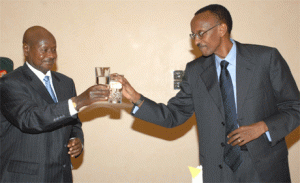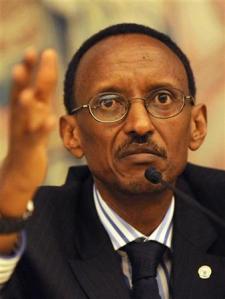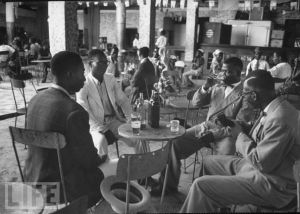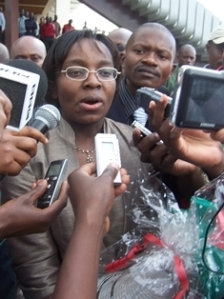Rwanda’s blood-soaked history becomes a tool for repression
by Geoffrey York – Globe and Mail (theglobeandmail.com)

Victoire Ingabire dared to speak of Hutus victims of genocide
Kigali � The symbolism was incendiary. In front of the mass graves where 250,000 genocide victims are buried, a Rwandan politician dared to speak of the Hutus who were killed in those same terrible months in 1994.
Perhaps more astonishingly, Victoire Ingabire was not imprisoned for her taboo comments � not so far, at least, although the police have interrogated her three times and accused her of the crime of spreading �divisionism.�
Her challenge is posing an uncomfortable dilemma for the minority Tutsi-led government that dominates Rwanda. Sixteen years after the genocide of an estimated 800,000 Tutsis by Hutu extremists, can the authorities tolerate a political candidate who appeals openly to the Hutus who still comprise 85 per cent of Rwanda’s population?
How long can the government use the genocide as a justification for strict controls on the political system? And who decides the official history of the genocide?
The woman at the centre of the storm is an unlikely politician: a cheerful 41-year-old emigrant who has worked as an accountant at a U.S. company in the Netherlands for the past decade.
She wears a frilly-strapped dress and giggles merrily when she is asked about the barrage of wild attacks on her in Rwanda’s state-controlled media.
But she is backed by many of the Hutus who fled to Europe and North America during the Rwandan wars of the 1990s. She clearly has money and resources. She rents a large house in one of Kigali’s most exclusive neighbourhoods, where she has a Land Cruiser parked in the driveway.
Ms. Ingabire’s decision to return to Kigali this year has sent shock waves through Rwandan politics. In a country where ethnic divisions are officially never discussed, she has dared to raise Hutu grievances � especially the killing of thousands of Hutus in 1994 and 1995, which she describes as a �crime against humanity.�
It’s a potent appeal. Many Hutus feel excluded from power, excluded from the best jobs and schools, and afraid to speak out. It was to them that Ms. Ingabire was deliberately appealing when she returned to Rwanda in January � after 16 years in exile � and made her controversial comments at the genocide memorial.
Ms. Ingabire has carefully couched her appeal in diplomatic language. She condemns the genocide, calling for reconciliation and dialogue. She denounces �extremists� on all sides. She urges the authorities to bring all criminals to justice, regardless of ethnicity. She pledges to work for a peaceful country, united in mutual respect.
Yet merely by talking of Hutu victims, she has triggered a firestorm of reaction. She and her assistant were assaulted by a gang of young men in a government office. Her assistant, who was badly beaten, has been jailed for �genocide� crimes. She is facing a police investigation for her alleged �genocide ideology.� And even the country’s powerful President, Paul Kagame, has warned that �the law will catch up with her� � a clear threat that she will be arrested.
At the heart of the battle between Ms. Ingabire and Mr. Kagame is a stark disagreement about Rwanda’s identity. The President argues that any talk of ethnicity must be suppressed because Rwanda is still in a fragile post-genocide period, where hatred and violence could rise again. His opponent sees this as an excuse for repression, leading only to resentment and bitterness among those who cannot speak out.
It is unclear whether the government will permit Ms. Ingabire to challenge Mr. Kagame in the presidential election in August. The President won the last election with an official margin of 95 per cent, and he has brooked no real opposition since 1994, when he led the Tutsi rebels who defeated the genocidal Hutu regime.
So far, Ms. Ingabire has been denied permission to gather the 200 signatures that she needs to register her political party. She is routinely subjected to fierce attacks in the pages of Rwanda’s only daily newspaper, the state-connected New Times, which refuses to publish her responses to the attacks.
�I don’t know why the government is so afraid of me,� she says. �They watch me and follow me all the time. I know anything can happen to me � they can arrest me, they can kill me.�
The managing director of the New Times, Joseph Bideri, confirmed that the newspaper refuses to give any �space� to Ms. Ingabire’s responses. He wrote a personal letter to her on Jan. 22, vowing she would never get a �platform� in the newspaper because she is a �genocide denier.�
In an interview, however, Mr. Bideri was unable to provide any evidence that Ms. Ingabire denies the genocide. In fact, in her public speeches and in a lengthy interview with The Globe and Mail, she repeatedly acknowledged and condemned the 1994 genocide. She draws a distinction between the slaughter of the Tutsis � which she calls a genocide � and the killings of many Hutus, which she describes as a �crime against humanity.�
Although she emigrated to the Netherlands shortly before the genocide began, Ms. Ingabire’s own family suffered in the genocide. Her brother was killed in 1994 because he was mistaken for a Tutsi.
�When people talk about the pain they feel, they need to understand that everybody feels pain,� she says. �We have to understand the pain of others. When I condemn the genocide, I’m also thinking of my brother. Not all Hutus are killers, and not all Tutsis are victims.�
International human-rights groups, including Amnesty International and Human Rights Watch, have criticized the Rwandan government for attacking and harassing opposition leaders such as Ms. Ingabire. Amnesty says the Rwandan law on �genocide ideology� is so vague and ambiguous that the authorities can use it to suppress dissent.
There is strong evidence to support Ms. Ingabire’s allegations of war crimes against Hutus. For example, a United Nations investigator in 1994 estimated that 25,000 to 45,000 civilians, primarily Hutus, were killed by the Rwandan Patriotic Front � the army of Mr. Kagame, now the governing party. Many other civilians, including thousands of Hutu refugees, were killed in further attacks in later years. Only a small handful of RPF members have been prosecuted for the Hutu deaths, which remain a taboo subject in Rwanda.
Ms. Ingabire says she doesn’t know how many Tutsis died in 1994, how many Hutus died, or even whether the number of Tutsi victims was larger than the number of Hutu victims. Some observers say she is leaving the impression of an equivalency between the two sides, despite historical evidence that the Tutsi victims were far more numerous and were the only ones subjected to a deliberate campaign of attempted extermination.
But even the Rwandan government has struggled with how to write the history of the genocide. At the memorial where 250,000 victims are buried, a guide says it commemorates only the Tutsi victims of the genocide. Yet he distributes an audio guide that calls it a memorial to the �Tutsi and moderate Hutu peoples� who were killed.
Didas Gasana, editor of a weekly newspaper whose staff is often harassed and threatened by the authorities for its independent views, says the government needs to provide justice and truth to the Hutu victims. �There needs to be debate and justice and openness,� he says. �It’s a part of history that can’t be denied.�
Mr. Gasana is himself a Tutsi. And despite the official view that ethnicity has disappeared, he says he is often told privately by government officials that he should not write such critical articles � because he is a Tutsi.
Geoffrey York – http://www.theglobeandmail.com/news/world/rwandas-blood-soaked-history-becomes-a-tool-for-repression/article1487568/.
March 9, 2010 No Comments
Strange Times in Kigali
Source: Christopher Vourlias – March 4, 2010.
I returned to Kigali this week with the hopes of enjoying some downtime before heading to eastern Congo. Sadly, this was not to be the case. As I recently reported, things in everyone�s favorite central African autocracy have taken a turn for the dysfunctional of late, even by this region�s strange standards. Grenade attacks, coup rumors, renegade generals on the run. If it weren�t for the fact that there�s not a beach in sight, I would�ve sworn I was back in Bujumbura.
Front and center has been the bizarre case of Lieutenant-General Kayumba Nyamwasa, a former army chief of staff who � after rumored sightings in Uganda � has apparently resurfaced in South Africa after fleeing the country last week. Kayumba, who was until recently serving as Rwanda�s ambassador to India, has had a strained relationship with the RPF leadership, after he was allegedly linked to a failed coup attempt in 2003. The diplomatic posting seems to reflect the conventional wisdom in Kigali, which is to keep your friends close, your enemies closer, and your failed-coup leaders in India. Uganda�s Sunday Vision reported on Kayumba�s contentious relationship with the government, citing local reports linking him to the troubled Green Party, as well as rumors that �no government official or even fellow soldiers attended the funeral of [Kayumba's] mother recently,� which is a dark tiding indeed for a Rwandan political figure.
Yesterday, a clearly peeved PK gave a press conference here in Kigali, at which he dispelled any rumors that the fleeing general � as well as another former army officer, Patrick Karegeya � had been plotting a coup against him, according to South Africa�s Independent.
�Nobody, absolutely nobody, not even Kayumba, can carry out a coup here. Think about it and you�ll come to the conclusion no one can carry out a coup� in Rwanda, the president said.
�People can only dream about it, wish for it; I believe what I�m telling you,� Kagame said.
Kagame went on to add: �Never ever ever ever ever. Never. Ever.�
The press conference comes on the heels of an announcement by the Prosecutor General Martin Ngoga, who told reporters with a straight face on Tuesday that the Kigali grenade attacks of last month have now been linked to none other than Lt. Gen. Kayumba Nyamwasa and Patrick Karegyeya. This comes after officials stated just hours after the attacks that two suspects had been apprehended, and that, in the definitive words of police spokesman Eric Kayiranga, �they belong to the Interahamwe militia.�
The Rwanda News Agency comments on the sudden about-face.
When three grenades exploded in Kigali two weeks ago and another in Huye district a week before, Police Spokesman Superintendent Eric Kayiranga quickly said investigations showed that Rwandan FDLR rebels were behind them.
The link has not been raised again. On Tuesday, the National Prosecuting Authority suddenly claimed that Gen. Kayumba Nyamwasa and Col. Patrick Karegeya were behind the grenade attacks. On Wednesday, President Kagame said the link between these two scenarios might be possible.
Why would former RPF stalwarts now be canoodling with the Interahamwe? Exactly how many FDLR Hutus do you think are on Lt. Gen. Faustin Kayumba�s Christmas-card list?
Undeterred by the hilarity of their accusations, the RPF today released photographic evidence that Messrs. Kayumba and Karegeya are, indeed, plotting with Interahamwe militia. �We finally have our smoking gun,� said Kagame.
The Kayumba saga comes against a backdrop of increasing intimidation and harassment of opposition politicians, as I�ve reported before. These have included threats most foul against at least three prominent opposition figures � Victoire Ingabire, of the FDU-Inkingi Party; Bernard Ntaganda, of the Parti Social-IMBERAKURI; and Frank Habineza, of the Democratic Green Party � and have (predictably) drawn outraged cries from the international community.
President Kagame, of course, has repeatedly defended his actions, citing the ever-present threat of Hutu rebels to the east and fifth columnists within. In an op-ed for The Guardian, Stephen Kinzer sums up the Kagame position.
He believes western human rights activists underestimate the prospects for a new outbreak of ethnic violence in Rwanda, as well as the danger of allowing ethnically charged speech. �We�ve lived this life,� he said angrily at a news conference. �We�ve lived the consequences. So we understand it better than anyone from anywhere else.�
The levels of intrigue here are�intriguing. Kagame is a master manipulator, who has repeatedly used the genocide as a pretext for bullying the international community and cracking down on internal dissent. The refrain of �we understand it better than anyone from anywhere else� has, in some form or other, become the de facto position of the Kagame administration. It is part of its us-against-the-world mentality, which has always included, as a lingering subtext, a reminder of how the West failed Rwanda during its darkest hour.
The president is a grand strategist, as PR-savvy as any American exec, and observers in this country are always forced to consider how a given event � whether it be grenade attacks in Kigali, or the return of a rabble-rousing exile � is being manipulated by the man upstairs. However damaging or threatening the latest news might seem, you know it is being redacted in His Excellency PK�s enigmatic noggin, before being regurgitated in a way that, ultimately, casts the Kagame regime in an ever more righteous light. Ingabire, for example, has been given a relatively free hand (by Rwandan standards) to state her case to the foreign press. But is Kagame simply holding back because the international spotlight is on her? Or is he playing a more patient hand, perhaps giving Ingabire enough rope to (metaphorically, of course) hang herself?
(The same laissez-faire attitude, unfortunately, has not been extended toward her erstwhile assistant, Joseph Ntawangundi, who just three days after being attacked alongside Ingabire, was promptly arrested and locked up on an outstanding warrant for crimes committed during the genocide.)
I�m not entirely sure what to make of these opposition leaders. Frank Habineza, President of the Democratic Green Party of Rwanda, for example, clumsily played the genocide card while appealing to the West to put pressure on Kagame for his repressive political tactics.
�We do not want the international community to wait, like it waited in 1994,� said Habineza, drawing a parallel that was unlikely to win him many fans. (You can hear more from Habineza here.)
And then there�s Ingabire. I�ve already written a bit about her political aspirations, after spending nearly 16 years in exile in Europe. The would-be president quickly stirred controversy by making some politically charged comments about Hutu victims at the genocide memorial. This more or less occurred while she still had crumbs from the in-flight meal on her chin.
Given such blatantly ethnic posturing � as well as some of the questionable figures looming in her background � it is hard to accept her intentions at face value. Likewise, the clumsy, stage-managed episode involving her supposed asylum request at the UK High Commission makes you wonder whether Ingabire isn�t as much a cool calculator as the man she hopes to dethrone. And you have to ask why someone so deeply concerned with the future of her country waited this long to return, anyway.
Recently Ingabire claimed that if the election were to be held tomorrow, the people would surely vote FDU into power, �because they know who we are.�
I don�t want to take anything away from the average man-on-the-collines here in Rwanda. I would like to give Rwandans � particularly the rural poor, who make up the bulk of this country�s population � the benefit of the doubt, and assume that, come August, they can and will calmly file to the polls with a selfless democratic spirit and full of only the highest of high-minded aspirations.
Unfortunately, that goes against everything I know about electoral politics in this region. Given the amount of time she has had to �campaign� in the country, I suspect most voters don�t know all that much about who Ingabire is. They simply know that she is a Hutu, and in a country where that group still holds a roughly 85 percent majority, she could very well be banking on the fact that that�s all they need to know. You can hardly blame the president, then, for being a bit concerned at the rumblings from below. And you have to wonder just what steps he might take in the next few months to suppress them.
March 7, 2010 No Comments
Deo Mushayidi Arrested In Burundi and Extradited To Rwanda

Deo Mushayidi
KIGALi – The former president of the Rwanda Journalists Association, Deo Mushayidi has been arrested on charges of terrorism and causing state insecurity.
The Prosecutor General, Martin Ngoga, said last evening that Mushayidi is part of a wider terror network that includes renegade military officers, Lt Gen Kayumba Nyamwasa and Patrick Karegeya.
�He has been shuttling between various countries in the region and our security forces have been monitoring his movements.
He was arrested following cooperation by law enforcement organs of our neighboring country, Burundi,� Ngoga said.
Mushayidi has since been extradited to Rwanda to face courts of law.
�He is now in the hands of our national police, we have a lot of evidence about his involvement and about the whole network,� Ngoga said.
�The rest are detail that we will keep for investigative purposes.�
The Prosecutor General revealed that at the time of his arrest, Mushayidi was not staying in Belgium as it had been claimed.
�In recent months he had been living in the region�.
Ngoga promised to keep updating Rwandans on the progress of the operation to track down members of the network.
Mushayidi�s arrest comes barely days after prosecution linked the grenade attacks that took place last month on the defected senior RDF officers, who are now reported to be in South Africa.
Source: The New Times.
March 6, 2010 No Comments
Kigali Insecurity Is Growing: Grenade Attacks Leave 16 Injured
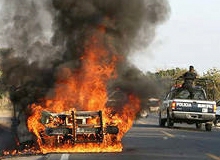
Kigali Insecurity
KIGALI – At least 16 people were yesterday evening wounded in two simultaneous grenade attacks in the city.
One of the attacks took place in Kimironko close to the taxi park, while the other occurred at Kinamba on the way to Gisozi Genocide Memorial Centre.
The grenades exploded during the heavy rain Thursday evening at around 19 hrs.
It was not clear by press time who was behind the attacks, but Police says investigations are ongoing.
�We are still investigating the case, details will be released later,� said the Police Spokesman Eric Kayiranga when contacted last night.
The Kimironko attack injured 12 people who were rushed to Kibagabaga Hospital while the Kinamba attack left four with minor injuries.
Senior security officers and senior government officials rushed to the scene immediately after the attack.
�The Kimironko attack left two people critically injured while the rest sustained minor injuries including those at Kinamba,� Kigali City vice Mayor in charge of Social Affairs, Jeanne d�Arc Gakuba Gakuba, said.
�The situation is under control and concerned authorities are doing their job to put things to order�.
Source: newtimes.co.rw.
March 5, 2010 No Comments
Rwanda Launches The East Africa’s First eID Scheme
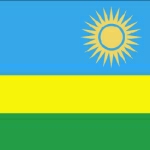
Rwanda Flag
Kigali – The Ministry of Local Government in Rwanda has agreed with De La Rue Identity Systems, a UK-based world expert in secure e-government identity solutions, to design and roll-out East Africa’s first national eID project for the Government of Rwanda, as part of the ongoing Rwandan National ID project (NID). The plans for systems integration, to combine data from the current ID card, passport and driver’s licence, are already underway. The first eID documents are expected to be distributed in around six months, following successful completion of the pilot phase.
Rwanda’s existing national ID card, also produced by De La Rue, is currently held by all citizens over the age of 16. It is envisaged the new eID card will replace this and contain additional e-government information, such as health and social security details. This puts Rwanda at the forefront of regional IT advancement.
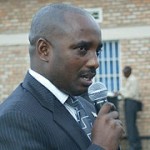
Pascal Nyamurinda-NID Project Coordinator
Pascal Nyamurinda, National ID Project Coordinator, Ministry of Local Government said “Rwanda is very proud to be launching East Africa’s first eID scheme. This project is of utmost importance for our country, providing our citizens with access to additional services through the use of a highly secure eID device. We have chosen to work with De La Rue for over ten years now and throughout that time we have been impressed by their constant efforts to exceed our expectations, always delivering an innovative and trusted solution.”
James Thorburn, Managing Director, De La Rue Identity Systems commented “De La Rue is delighted to be strengthening its relationship with Rwanda, focused on delivering a dynamic strategic project. We already provide the country’s passport, current ID card, driver’s licence and supporting systems so we are able to use our local knowledge and expertise, as well as experience from implementing over 50 national schemes, to ensure successful implementation of the new eID project.”
De La Rue is the world’s largest commercial security printer and papermaker, involved in the production of over 150 national currencies and a wide range of security documents such as passports, authentication labels and fiscal stamps. De La Rue employs over 4,000 people across 24 countries and is a member of the FTSE 250. Its ordinary shares are listed with the UK Listing Authority and trade on the market for listed securities on the London Stock Exchange under the symbol DLAR.
February 12, 2010 No Comments
Mrs Victoire Ingabire, Chair Of FDU-Inkingi, Addresses The Rwandan People At Her Arrival in Kigali-Rwanda
At her arrival at the International Airport of Kanombe- Kigali this Saturday 16 January, 2010, Mrs Victoire Ingabire Umuhoza, addressed a very powerful message to the Rwandan People in Kinyarwanda. Here is the official translation of her speech as posted on FDU-Inkingi’s website:
I am back home.
Rwandans, my beloved people,
16 years in exile was an eternity. Today, I am back home.
A lot has happened. The summum was the genocide, the massacres and war crimes. Millions of Rwandans have been killed. Each family is still mourning the victims. The current regime has been unable to deliver any sound solution. A genuine national reconciliation process is still a dream. Rwandans are still terrorised.
My message is clear: I object to violence.We must put an end to any form of violence, if not, the violence will finish us. Peace is my motto, my guiding principle.
In exile, 3 years ago we launched the United Democratic Forces, UDF-INKINGI, with clear objectives:
- To set up a genuine multi-party democratic system;
- To create the right conditions conducive for an all-inclusive national dialogue;
- To put an end to impunity and to create the right social and political atmosphere for the healing of all the surviving victims without any segregation;
- To put an end to discrimination and to guarantee equal opportunity to all the Rwandan citizens;
- To repatriate refugees and to ensure their resettlement and re-integration;
- To reorganize the national economy to suit national aspirations and;
- To put to rest all pretences of expansionism and to contribute towards the restoration of peace and security in the region.The time is now to come back home. Because it is time to uproot for good the “INGOYI” or all forms of dictatorship, violence, intimidations, victor’s justice, impunity, all sorts of discrimination.
We have the conviction that the building of a State must be based on the respect of the dignity of the human person, his freedom and rights, and on accountability. It is time to quietly spread the word and break the pervasive apathy. The time is now and the right people are you, Rwandans. Foreigners and the international community, have distantly witnessed on their televisions the genocide and the massacres. Do they see the oppression, the misery, the despair, the militarisation, the dictatorship? If yes, what are they doing? Business.
I am empowered by warm greetings and blessings of your exiled sisters and brothers. They are on your side. They know the immensity of your sacrifices.
I am a daughter and a mother, moved by the misery and humiliations of my people. I don’t need an army to defeat the dictatorship. All we need is determination, commitment and patience. The sacrifices of all committed people will overcome our misery and these endless crisis in our motherland. The upcoming presidential elections are not an end to this process.
To you all courageous Rwandans, who directly and silently endured those humiliations, your tears of sorrow and pain are a permanent call. Your “silence for survival” has inspired this non-violent revolution.We don’t need another war in our country. Too much blood has been poured. Enough is enough. The color of blood is red.� So is the mark on the faces and the eyes of criminals.
It’s still premature to call you for public meetings, demonstrations and sit-ins. We need first to raise our awareness. But if your lives are in danger, peacefully attend the political meetings of your oppressors and their tools. This will allow you to better know them and their methods.
All we need is a free and fair election with total transparency of vote counting by the public and in public.
The debate about eventual current or past positive performances of the regime is mere propaganda. They have tools, public or private media and a well experienced brain-washing publicity.
Yes many will be seduced by those luxurious buildings and residences and totally miss the misery, the pain, the despair, the discrimination, the hunger, poor health, or other dictatorial practices imposed to our people.
Together we shall overcome.
Victoire Ingabire Umuhoza
January 17, 2010 No Comments

